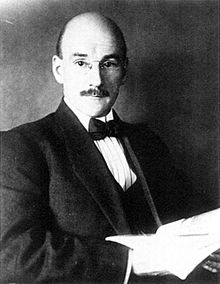This article needs additional citations for verification. (August 2008) |
Henry H. Goddard | |
|---|---|
 | |
| Born | August 15, 1866 |
| Died | June 18, 1957 (aged 90) |
| Occupation(s) | Academic psychologist, American football coach |
| Known for | Eugenicist and segregationist |
| Academic background | |
| Education | |
| Academic work | |
| Discipline | Psychologist |
| Sub-discipline | Intelligence |
| Institutions |
|
| Notable students | Marie Skodak Crissey[1] |
Henry Herbert Goddard (August 14, 1866 – June 18, 1957) was an American psychologist, eugenicist, and segregationist during the early 20th century. He is known especially for his 1912 work The Kallikak Family: A Study in the Heredity of Feeble-Mindedness,[2] which he himself came to regard as flawed for its ahistoric depiction of the titular family, and for translating the Binet-Simon Intelligence Test into English in 1908 and distributing an estimated 22,000 copies of the translated test across the United States. He also introduced the term "moron" for clinical use.[2]
He was the main advocate for the use of intelligence testing in societal institutions including hospitals, schools, the legal system and the military. He helped develop the new topic of clinical psychology, in 1911 helped to write the first U.S. law requiring that blind, deaf and intellectually disabled children be provided special education within public school systems,[citation needed] and in 1914 became the first American psychologist to testify in court that subnormal intelligence should limit the criminal responsibility of defendants.
- ^ "Feminist Voices – Marie Skodak Crissey". Psychology's Feminist Voices. Retrieved May 12, 2021.
- ^ a b "How Science Created Morons by Science Vs". Gimlet Media. Retrieved June 6, 2018.